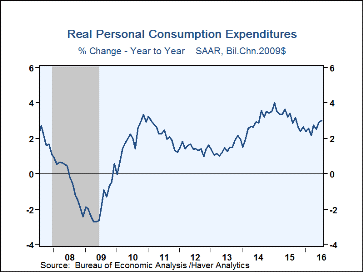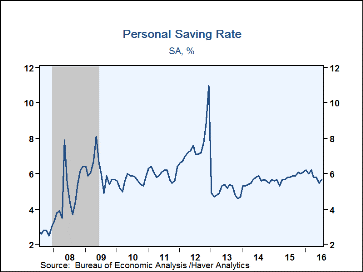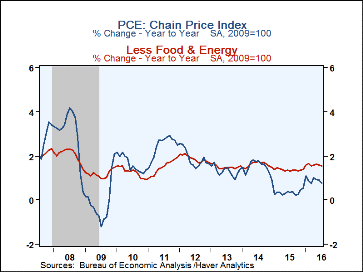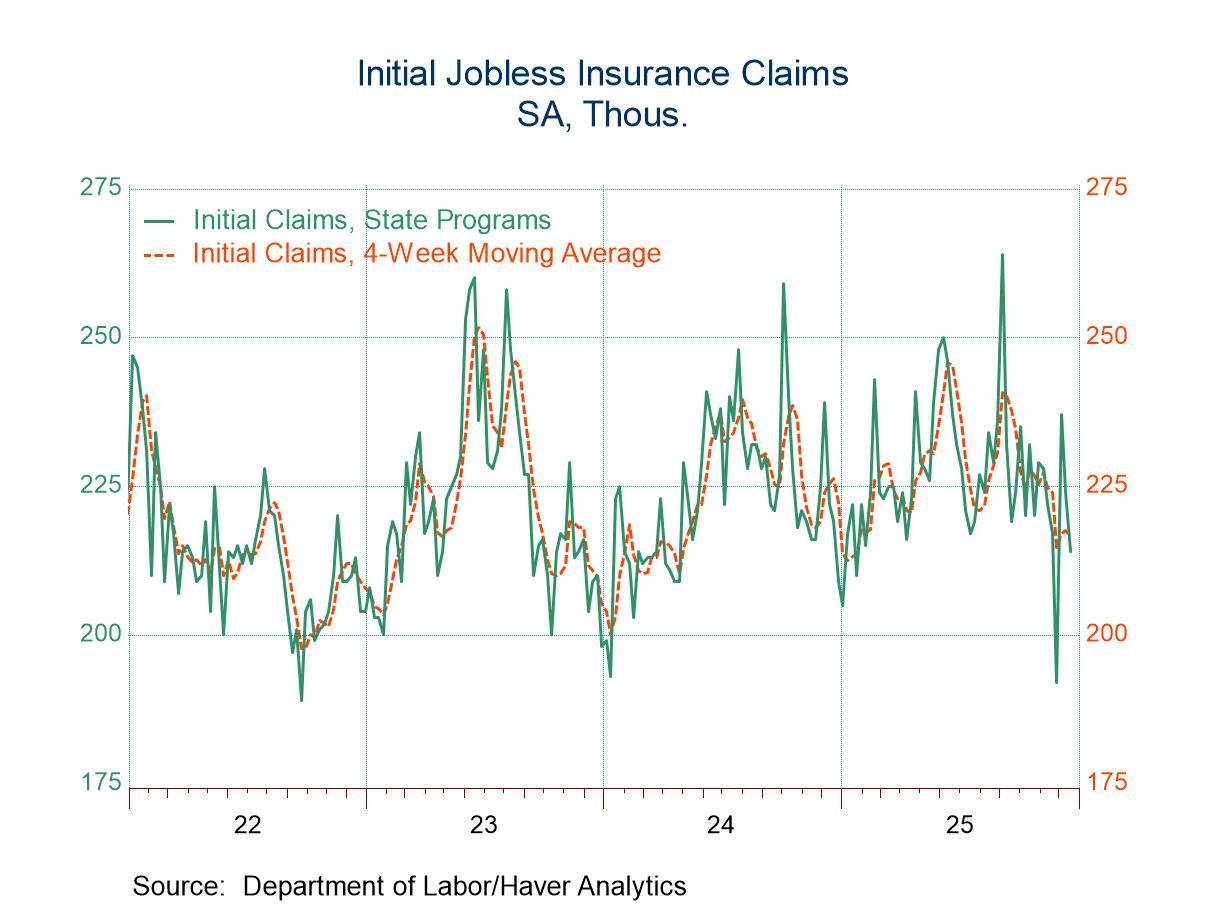 Global| Aug 29 2016
Global| Aug 29 2016U.S. Personal Spending and Income Improve
by:Tom Moeller
|in:Economy in Brief
Summary
Personal consumption expenditures increased 0.3% (3.8% y/y) during July following a 0.5% June rise, revised from 0.4%. The latest gain matched expectations in the Action Economics Forecast Survey. So far this year, spending has risen [...]
Personal consumption expenditures increased 0.3% (3.8% y/y) during July following a 0.5% June rise, revised from 0.4%. The latest gain matched expectations in the Action Economics Forecast Survey. So far this year, spending has risen at a 4.5% annual rate compared to a 3.5% rise during all of last year. Adjusted for price inflation, spending rose 0.3% (3.0% y/y) last month after a 0.4% gain.
Current dollar purchases of nondurable goods declined 0.5% (+0.4% y/y) as gasoline purchases fell 3.7% (-16.9% y/y) with lower prices. Clothing purchases also eased 0.1% (+1.4% y/y). Durable goods spending jumped 1.6% (3.8% y/y) after a 0.3% rise. Motor vehicle & parts spending strengthened 4.5% (2.1% y/y), and furnishings & durable household equipment buying improved 0.5% (5.0% y/y). Services spending gained 0.4% (4.9% y/y), the weakest increase since March. Recreation services buying increased 1.2% (5.3% y/y), but spending on food services & accommodations remained unchanged (5.2% y/y).
Personal income improved 0.4% during July (3.3% y/y) following increases of 0.3% in the two prior months. A 0.4% rise had been expected. Disposable personal income gained 0.4% (3.6% y/y). In chained dollars, take-home pay also increased 0.4% (2.7% y/y), the strongest rise since December. So far this year, real disposable income has risen at a 2.4% annual rate.
Wage & salary income gained 0.5% (4.1% y/y) as it did in June. Manufacturing sector wages strengthened 0.8% (3.5% y/y) and service-producing wages rose 0.5% (4.5%.y/y). Government sector wages improved 0.3% (2.8% y/y). Rental income grew 0.7% (6.8% y/y), but proprietors income gained just 0.2% (2.3% y/y). Receipts on assets recovered 0.3% (-0.6% y/y) after a 0.2% fall. Transfer receipts jumped 0.4% (3.5% y/y), the strongest gain since February.
The personal savings rate rose to 5.7% after a decline to 5.5%. It remained down from 6.1% averaged both in Q1'16 and in Q4'15. Personal saving increased 0.5% y/y.
The PCE Chain Price Index remained unchanged (0.8% y/y), the weakest performance since February. Nondurable goods prices declined 0.4% (-2.1% y/y) as gasoline prices fell 4.2% (-18.9% y/y). Apparel prices rose 0.1% but were flat y/y. The durable goods price index declined 0.3% (-2.3% y/y) as home furnishing and durable household equipment prices fell 0.5% (-2.8% y/y). Remaining unchanged were both motor vehicle prices (-4.6% y/y) and recreational vehicle & product prices (-4.6% y/y). The services price index gained 0.2% (2.3% y/y).
The personal income & consumption figures are available in Haver's USECON database with detail in the USNA database. The Action Economics figure is in the AS1REPNA database. Further detail is in USNA.
| Personal Income & Outlays (%) | Jul | Jun | May | Jul Y/Y | 2015 | 2014 | 2013 |
|---|---|---|---|---|---|---|---|
| Personal Consumption Expenditures | 0.3 | 0.5 | 0.3 | 3.8 | 3.5 | 4.4 | 2.8 |
| Personal Income | 0.4 | 0.3 | 0.3 | 3.3 | 4.4 | 5.2 | 1.1 |
| Wages & Salaries | 0.5 | 0.5 | 0.4 | 4.1 | 5.1 | 5.1 | 2.7 |
| Disposable Personal Income | 0.4 | 0.3 | 0.3 | 3.6 | 3.8 | 5.1 | -0.1 |
| Personal Saving Rate | 5.7 | 5.5 | 5.8 | 5.8 (Jul. '15) |
5.8 | 5.6 | 5.0 |
| PCE Chain Price Index | 0.0 | 0.1 | 0.2 | 0.8 | 0.3 | 1.5 | 1.3 |
| Less Food & Energy | 0.1 | 0.1 | 0.2 | 1.6 | 1.4 | 1.6 | 1.5 |
| Real Personal Consumption Expenditures | 0.3 | 0.4 | 0.2 | 3.0 | 3.2 | 2.9 | 1.5 |
| Real Disposable Income | 0.4 | 0.2 | 0.1 | 2.7 | 3.5 | 3.5 | -1.4 |
Tom Moeller
AuthorMore in Author Profile »Prior to joining Haver Analytics in 2000, Mr. Moeller worked as the Economist at Chancellor Capital Management from 1985 to 1999. There, he developed comprehensive economic forecasts and interpreted economic data for equity and fixed income portfolio managers. Also at Chancellor, Mr. Moeller worked as an equity analyst and was responsible for researching and rating companies in the economically sensitive automobile and housing industries for investment in Chancellor’s equity portfolio. Prior to joining Chancellor, Mr. Moeller was an Economist at Citibank from 1979 to 1984. He also analyzed pricing behavior in the metals industry for the Council on Wage and Price Stability in Washington, D.C. In 1999, Mr. Moeller received the award for most accurate forecast from the Forecasters' Club of New York. From 1990 to 1992 he was President of the New York Association for Business Economists. Mr. Moeller earned an M.B.A. in Finance from Fordham University, where he graduated in 1987. He holds a Bachelor of Arts in Economics from George Washington University.










